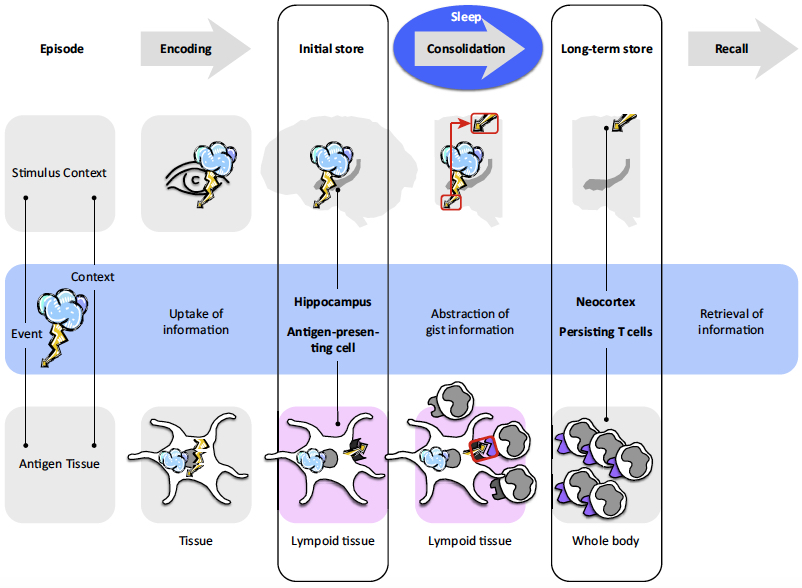Sleep may strengthen long-term memories in the immune system
October 6, 2015

A model of memory formation in the central nervous system (upper section) and the immune system (lower section) (credit: Westermann et al./Trends in Neurosciences 2015)
Deep (slow-wave*) sleep, which helps retain memories in the brain, may also strengthen immunological memories of encountered pathogens, German and Dutch neuroscientists propose in an Opinion article published September 29 in Trends in Neurosciences.
The immune system “remembers” an encounter with a bacteria or virus by collecting fragments from the microbe to create memory T cells, which last for months or years and help the body recognize a previous infection and quickly respond. These memory T cells appear to abstract “gist information” about the pathogens, allowing memory T cells to detect new pathogens that are similar, but not identical, to previously encountered bacteria or viruses.
Studies in humans have shown that long-term increases in memory T cells are associated with deep slow-wave sleep on the nights after vaccination. Taken together, the findings support the view that slow-wave sleep contributes to the formation of long-term memories of abstract, generalized information, which leads to adaptive behavioral and immunological responses.
How lack of sleep puts your body at risk
The obvious implication is that sleep deprivation could put your body at risk. “If we didn’t sleep, then the immune system might focus on the wrong parts of the pathogen,” says senior author Jan Born of the University of Tuebingen.
“For example, many viruses can easily mutate some parts of their proteins to escape from immune responses. If too few antigen-recognizing cells [the cells that present the fragments to T cells] are available, then they might all be needed to fight off the pathogen. In addition to this, there is evidence that the hormones released during sleep benefit the crosstalk between antigen-presenting and antigen-recognizing cells, and some of these important hormones could be lacking without sleep.”
Born says that future research should examine what information is selected during sleep for storage in long-term memory, and how this selection is achieved. This research could have important clinical implications.
“In order to design effective vaccines against HIV, malaria, and tuberculosis, which are based on immunological memory, the correct memory model must be available,” Born says. “It is our hope that by comparing the concepts of neuronal and immunological memory, a model of immunological memory can be developed which integrates the available experimental data and serves as a helpful basis for vaccine development.”
* Slow wave sleep (SWS) is the constructive phase of sleep for recuperation of the mind-body system in which it rebuilds itself after each day. Substances that have been ingested into the body while an organism is awake are synthesized into complex proteins of living tissue. Growth hormones are also secreted to facilitate the healing of muscles as well as repairing damage to any tissues. Lastly, glial cells within the brain are restored with sugars to provide energy for the brain. Longer periods of SWS occur in the first part of the night, primarily in the first two sleep cycles (roughly three hours). — Wikipedia
Abstract of System Consolidation during Sleep — A Common Principle Underlying Psychological and Immunological Memory Formation
Sleep benefits the consolidation of psychological memory, and there are hints that sleep likewise supports immunological memory formation. Comparing psychological and immunological domains, we make the case for active system consolidation that is similarly established in both domains and partly conveyed by the same sleep-associated processes. In the psychological domain, neuronal reactivation of declarative memory during slow-wave sleep (SWS) promotes the redistribution of representations initially stored in hippocampal circuitry to extra-hippocampal circuitry for long-term storage. In the immunological domain, SWS seems to favor the redistribution of antigenic memories initially held by antigen-presenting cells, to persisting T cells serving as a long-term store. Because storage capacities are limited in both systems, system consolidation presumably reduces information by abstracting ‘gist’ for long-term storage.